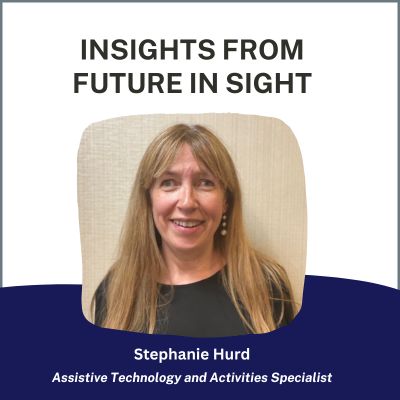
Schools and families are well under way with their back to school routines. What about after school fun? How do youth who are blind and visually impaired fill those remaining hours between the school bell, dinner bell and time for bed?
Here’s some ideas, which are broken down into age groups. Keep in mind youth with sight loss may pick up these options at different ages. Also, some interests may carry over throughout their lives. Learning and fun does not come in a formula as one size fits all, but hopefully these ideas will jumpstart families into some great after school exploration.
Preschool and Kindergarten:
- Sensory play: awaken and explore with textured items. Some examples include scooping and sifting rice or creating maracas for their very own band.
- Encourage play that uses motor skills and spatial awareness by setting up indoor obstacle courses with soft seat cushions and pillows. Activities like these are especially great on a rainy afternoon.
- Introduce and strengthen social skills through play dates; especially initially at one’s own home, where toys and environment are familiar.
Elementary
- Music lessons: Whether it’s piano, the recorder, or other instruments, it’s never too early to take up learning to play a musical instrument.
- Recreation and other after school athletics help youth to release energy, foster friendships, and explore sports (such as gymnastics, soccer and so on). Be sure to meet with the program instructors to share about modifications such as using a soccer ball with bells.
- Tactile science and exploration groups such as Legos stimulate creativity and reinforce following instructions.
Middle School
- Get involved in accessible technology, coding and programming clubs that teach and promote technology skills.
- Art and sculpture classes help discover the artist through different mediums.
- Babysitting classes for tweens at the Red Cross provide readiness and learning when it comes to safety handling emergencies, and what it might take to stay at home for a few hours independently or babysitting in one’s neighborhood.
High School
- Theater and drama groups are a terrific way to become expressive and join the world of acting. Many high schools put on plays and musicals to become a part of on and off stage.
- Community service projects and volunteering in areas of interest of teens may often lead to a first after school job experience. Check in with your high school guidance office, local businesses and perhaps family connections to obtain volunteer experience. Be sure to also check out our transition age services as part of our Real World Skill-Building Series.
- High School band or chorus serves as a great outlet not only to pursue music interests, but offers a terrific tight social community.
Remember, all of these ideas are fluid and may very well overlap throughout preschool through high school. It’s all about tapping into interests and strengths each youth who is blind and visually impaired possesses. Explore, engage, and most of all, have after school fun!
For a list of group meetings and activities we offer to those of all ages who are blind and visually impaired, visit our calendar. If you or someone you love is experiencing vision loss and could benefit from our services, please contact Future In Sight at [email protected] or 603-224-4039 today!
About the Author: Stephanie Hurd is the Assistive Technology and Activities Specialist at Future In Sight.

